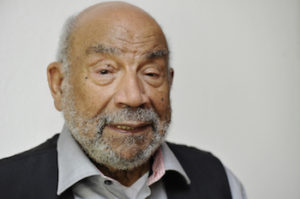
Theodor Michael
*Theodor Michael was born on this date in 1925. He is an Afro German economist, editor, lecturer, and actor.
From Berlin, his father, Theophilius Wonja Michael, was from Cameroon and arrived in Germany in 1894; his mother, Martha Wegner, was a white German. His African grandfather was one of several community leaders who signed protection treaties with German explorers, and later Imperial Consul-General Gustav Nachtigal in 1884, that began the German colonization of Cameroon after the Berlin Conference.
Germany’s African colonies were Togo, Cameroon, Tanganyika, and Namibia. These were lost after Germany lost World War I and divided up by France and England in 1919. Growing up, white German children would sometimes ask young Michael if he was from the Rhineland. This was because there were other Afro-Germans born in the Rhineland, the children of local German women, and some 25 000 to 40,000 African soldiers stationed there as occupation forces by France from 1919 to 1929. Many of these soldiers were Senegalese Tirailleurs.
These mixed-race children were often referred to as “Rhineland bastards.” The German government protested the presence of African soldiers in the Rheinland, and much propaganda was written about these soldiers kidnapping and raping White women. The situation was often referred to as the “Schwarze Schmach” or “Black Shame.” Adolf Hitler in Mein Kampf wrote, “the Jews had brought the Negroes into the Rhineland with the clear aim of ruining the hated white race by the necessarily-resulting bastardization.” It’s hard to know if and how many of these children survived the Nazis.
In 1926, his mother, Martha Wegner, died, leaving behind her four-mixed race children, Theodor, James, Juliana, and Christiana. His father was a circus performer, and after his death, Theodor and his siblings were taken in by his father’s circus colleagues. Most Blacks in Germany at the time worked in the entertainment industry. Africans were hired to portray “traditional African dances and songs”. People would pay to see them perform as if they were animals in a zoo. But it was a living. When Theodor got older, even he performed in these circuses, singing songs he didn’t even understand the words to.
As time went on, the racist policies of the Nazi regime began to affect his life more and more. In 1936, mixed-race Germans lost citizenship and declared “fremde” foreigners. He lost his job as a bellhop at Hotel Excelsior due to a complaint from a Nazi guest. Theodor found work in films. He was cast in a small but visible role in Germany’s first color film in 1943, “Muenchhausen”. He played an African servant cooling dignitaries with a feathered fan. Propaganda Minister Joseph Goebbels commissioned the film.
Michael eventually went back to school, receiving a Master’s Degree from the Institute of Economics and Politics in Hamburg. He traveled to Africa as the editor of the journal Afrika-Bulletin and as the economic advisor for German development projects in Niger, Ghana, and Nigeria. In the 1960s, he visited Cameroon and saw his father’s birthplace, commenting that he has always felt a connection to Africa, and as a child, his father told him African folktales at bedtime. However, Michael sees himself as German, first and foremost. In 1997, Michael appeared in a British documentary entitled “Black Survivors of the Holocaust” (Hitler’s Forgotten Victims UK Title) by David Okuefuna and Moise Shewa. He was happily surprised to find that at Britain’s Holocaust Museum, there were many documents about the Afro-German experience under the Nazis.
In 2000, he was invited to speak about his experience in Nazi Germany at Howard University in Washington, D.C. His lecture was entitled “German-African Relations–A Retrospective From the Colonial Period Until Unification.” He had been invited by the university’s Department of Modern Languages and Literature to help integrate black German history and culture into the school's German curriculum and to foster a dialogue between blacks in Germany and the Howard community. The experience of Blacks in Nazi Germany and Afro-Germans are not well documented in the United States. In 2009, Michael received Germany’s first Black History Month Award for his role as an Ambassador for the Afro German community. Theodor currently lives in Cologne with his second wife.